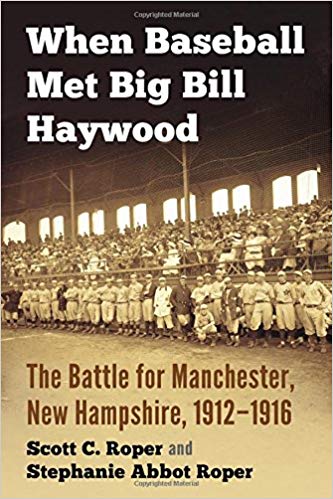When Baseball Met Big Bill Haywood: The Battle for Manchester, New Hampshire
When Baseball Met Big Bill Haywood: The Battle for Manchester, New Hampshire, 1912-1916, by Scott C. Roper and Stephanie Abbot Roper (Jefferson, NC: McFarland & Company, Inc., 2018)
Review by Lee Lovenfish, a leading historian of baseball and the author of “The Imperfect Diamond: A History of Baseball’s Labor Wars” and “Branch Rickey: Baseball’s Ferocious Gentleman.”
This subject interested me because I knew that baseball’s first commissioner, federal Judge Kenesaw Mountain Landis, had presided over the 1919 trial of Big Bill Haywood and his “Wobbly” cohorts in the Industrial Workers of the World. I knew that Landis had also engaged during down moments at the trial in some repartee with Haywood. I looked forward to this volume because Scott and Stephanie Roper are excellent researchers and fine writers, specializing in geography and U. S. history. While researching my biography of Branch Rickey, I profited from their long article about the 1946 racial integration of the Dodgers’ Nashua, New Hampshire low minor league farm team that featured the debuts in organized baseball of future Brooklyn stars Roy Campanella and Don Newcombe. (It appeared in volume 53 of “Historic New Hampshire,” Spring-Summer 1998 issue).
Unfortunately, this book sheds very little light on the interest of Big Bill Haywood in baseball in any aspect – minor league, major league, or the game as an escape from the harshness of working-class reality. Haywood hardly is a presence in the book, his name takes up fewer than two lines in the index. Neither could I find in the text any discussion of his allies in the labor movement talking about how baseball could or couldn’t be used as a tool to increase working-class consciousness. It is true, though, that the book is an excellent monograph about the competing interests of different companies in Manchester, New Hampshire in sponsoring baseball teams to keep workers occupied in their leisure time and presumably having less time to become class-conscious workers.

